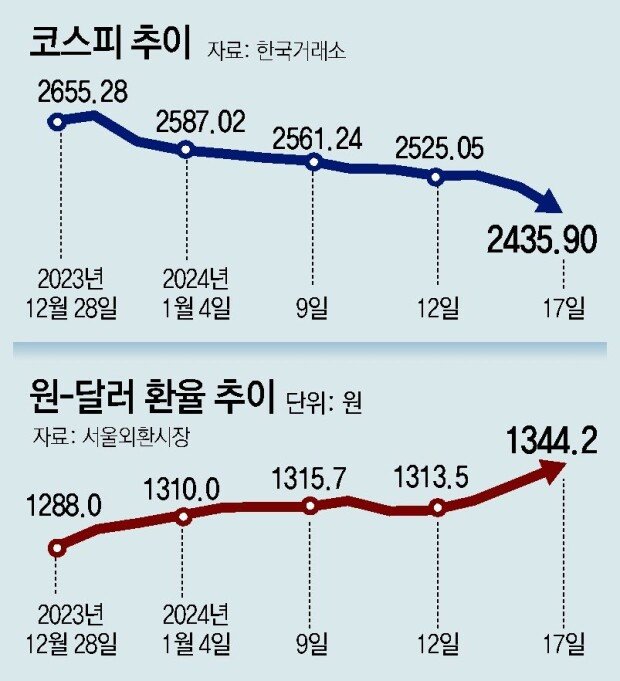KOSPI experiences 2.5% drop amidst foreign investors selling
KOSPI experiences 2.5% drop amidst foreign investors selling
Posted January. 18, 2024 07:33,
Updated January. 18, 2024 08:34

KOSPI, experiencing a significant downturn since the beginning of the new year, saw a steep decline of nearly 2.5% on Wednesday. This sharp drop can be attributed to robust selling activity by foreign investors. Additionally, the won-dollar exchange rate surged by more than 12 won, reaching its highest level in approximately two and a half months.
KOSPI concluded at 2,435.90 on the day, marking a significant decrease of 2.47% (61.69 points) compared to the previous day. This represents the first time in two months that KOSPI has fallen below the 2,440 mark since Nov. 14 last year (2,433.25). The Wednesday decline is the most substantial since Oct. 26 last year, which recorded a drop of minus 2.71%. Concurrently, the KOSDAQ index also experienced a decline, closing at 833.05, down 2.55%.
President Yoon Suk Yeol visited the Korea Exchange on the day, expressing his commitment to address the issue of the 'Korea Discount' (undervaluation of the Korean stock market). However, most of the office’s electronic display boards on the first floor of the exchange featured blue arrows indicating a decline in stock prices. President Yoon participated in the stock market opening ceremony for the first time as a sitting president on Jan. 2. But since then, the domestic stock market has displayed movements contrary to the government's expectations. Except for Jan. 2 and 15, out of the 12 trading days this year, KOSPI witnessed a substantial decline of 8.3%. Notably, during this period, the market capitalization alone plummeted by more than 148 trillion won.
Since the beginning of the year, the Korean stock market is reported to have faced a 'trifecta of bad news.’ The strengthening of foreign investors' risk aversion is attributed to diminished expectations for an early interest rate cut by the U.S. Federal Reserve. Additionally, the underperformance of stocks with top domestic market capitalization and geopolitical risks, such as North Korea's provocations and the escalation of conflict in the Middle East, have further contributed to the decline in the domestic stock market. These factors have led foreign investors to exit the Korean stock market.
As foreigners sold their stocks in significant numbers and converted them into dollars, the won-dollar exchange rate experienced a substantial surge. On Wednesday, the won-dollar exchange rate in the Seoul foreign exchange market concluded at 1,344.2 won, marking an increase of 12.4 won from the previous trading day. Within a span of two days, the exchange rate escalated by more than 20 won, and compared to the end of last year, it has surged by 56.2 won. There is a growing anxiety among some observers that the 'king dollar' phenomenon, where the won-dollar exchange rate exceeded 1,400 won in November 2022 due to the prolonged tightening of the U.S. Federal Reserve, may potentially be repeated.
abro@donga.com







